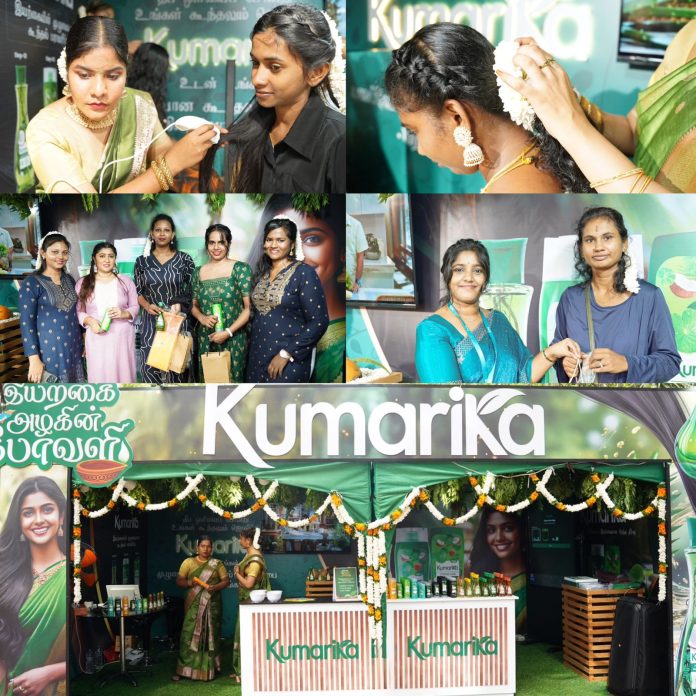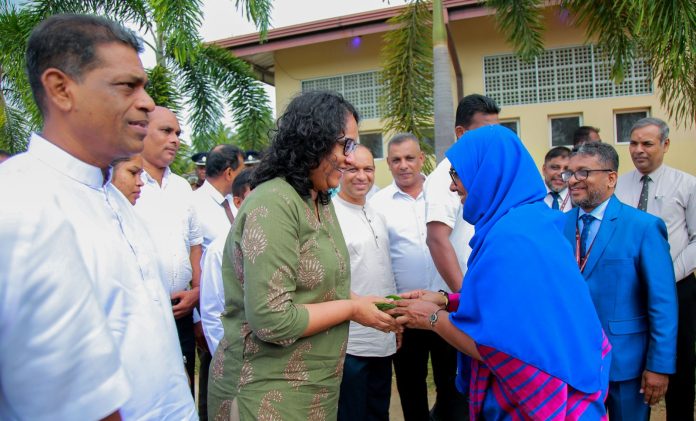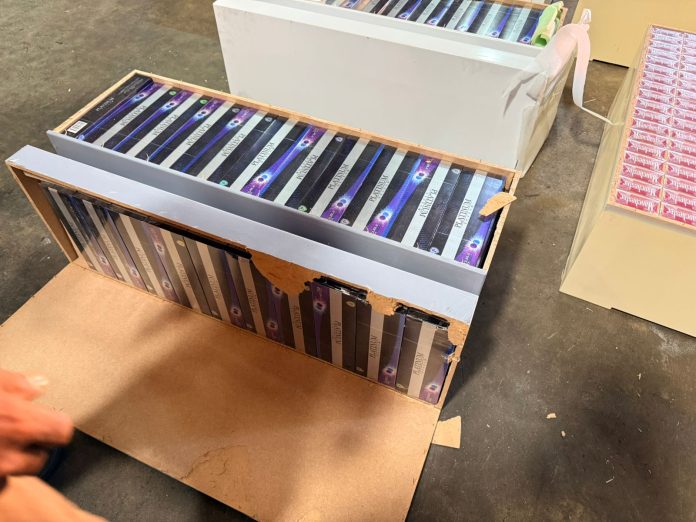Kumarika, Shines Bright in Trincomalee with ‘Iyarkai Oliyin Deepawali’
Kumarika, one of Sri Lanka’s most loved natural hair care brands, celebrated Deepawali in Trincomalee through its special “Iyarkai Oliyin Deepawali” celebration. Held at the historic Koneshwaram Kovil, the event not only spread festive joy among the community but also created a meaningful impact through dedication to educating and empowering women to embrace the strength glow of nature, through complete hair care.
The celebratory event was attended by over 1,000 women, who participated in personalized hair analysis sessions and enjoyed free hair styling and garland makeovers, infusing beauty with tradition. To make things even more memorable, participants received cultural gifts such as sarees, accessories, umbrellas, and Kumarika gift boxes as tokens of appreciation, that added warmth and delight to their Deepawali celebrations.
At the heart of the event, was the message that ‘true beauty is natural’, which has been central for Kumarika for decades. The brand encouraged women to follow a Complete Hair Care Ritual with Kumarika’s 100% extract-infused Hair Oil, Shampoo and Conditioner. This trusted range delivers root-to-tip nourishment, double the benefit and faster results.
Hirushi Fernando, Hair Care Category Head, Hemas FMCG, stated, “At Kumarika, we believe true beauty begins with nature and care. This Deepawali, through our ‘Iyarkai Oliyin Deepawali’ initiative, we celebrated not just the festival of light, but also the inner glow and confidence of every woman. Kumarika has always stood for natural beauty and empowerment, and we are humbled to have shared this journey with the Tamil community of Trincomalee.”
Through this celebration, Kumarika was able to reinforce its legacy as a brand that is built on natural care and trust. The brand has stood for 30-years as a symbol of ‘Iyarkai Azhagu’ or ‘natural beauty’, inspiring women across the country to rediscover confidence and self-worth through the power of nature. The initiative in Trincomalee activation was a vivid expression of that promise, blending culture with genuine care.
The event drew strong participation and engagement, with hundreds of women taking part in haircare experiences, product demonstrations and styling session. It also created a meaningful digital presence, extending the celebration of natural beauty far beyond the venue.
“Iyarkai Oliyin Deepawali” was a celebration to remember for the women of Trincomalee. It was a moment where tradition, self-care and natural beauty met harmoniously, and Kumarika once again stood as a beacon of empowerment and authenticity
Education is the foundation of the country’s cultural transformation.
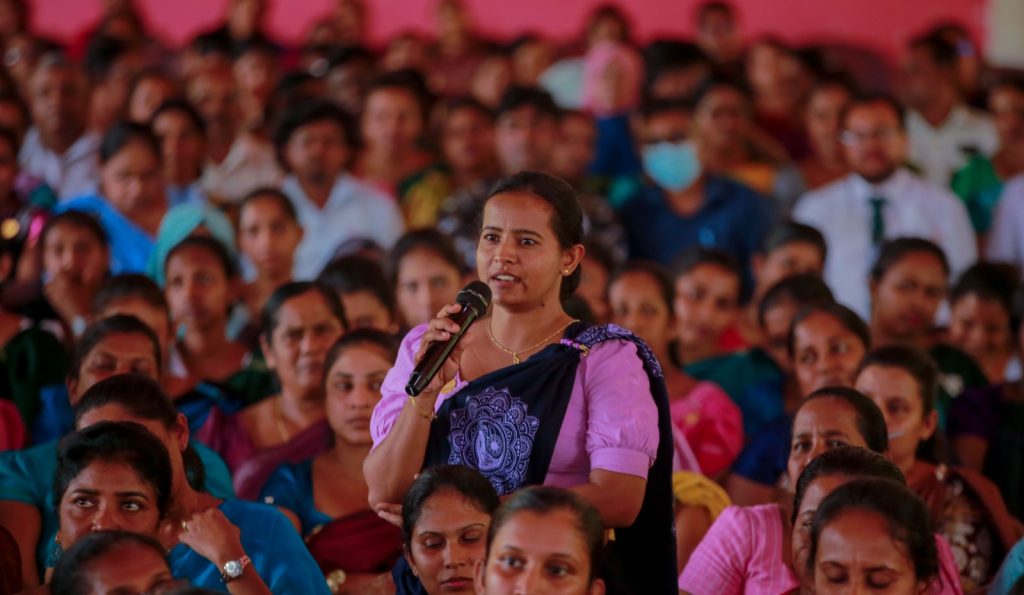
It is the collective responsibility of all of us to strengthen the learning process and provide a quality education to the nation’s children.
Minister of Education, Higher Education and Vocational Education, Prime Minister Dr. Harini Amarasooriya.
With the change in political authority, the people, who expected widespread change in every sector of the country, strongly expected that change in the education system.
Programs were held to inform teachers of grades 01 and 06 of schools in the Samanthurai and Ampara zones of Kalmunai, and to inform district education authorities and principals about the educational reforms that were taking place at Al Azraq College in Kalmunai and D. S. Senanayake College in Ampara. Addressing the principals at D. S. Senanayake College in Ampara, the Minister of Education, Higher Education and Vocational Education, Prime Minister Dr. Harini Amarasooriya made the following statement.
The Minister told the principals that the efforts and dedication made to maintain the free education that was bestowed upon us by the Kannangara Chinthana amidst many problems such as resource disparity, lack of infrastructure and teacher shortage should be appreciated and that the education authorities, principals and teachers should be appreciated without fail.
The Minister said that although there are currently 10,097 schools in Sri Lanka, unlimited educational competition exists in a limited number of schools, around 300. She added that while the number of students in a classroom in some such schools is as high as 50-60, in some remote areas the number of students in a school is limited to a very small number of 10-20, and that these are clearly two extremes with a large disparity.
Dr. Harini Amarasuriya stated here that the government urgently needs to eliminate this disparity and that for this purpose, positive steps such as developing the infrastructure of schools and eliminating the teacher shortage will be taken, while also maintaining the number of students in a class at an appropriate level of 30-35 and taking necessary measures to make the teaching and learning process in schools successful.
The Minister emphasized that at a time when we are trying to build a transformative change in the education system through education reform, it is the collective responsibility of all of us to strive to create the next generation of leaders so that no child or school is left behind, and that this process cannot be carried out by one person alone and requires the support of all.
The Deputy Minister of Rural Development, Social Security and Community Empowerment, Wasantha Piyatissa, Members of Parliament, Priyantha Wijeratne, Adambawa, and provincial education authorities were present at the event.
The annual Kathina Punya Mahothsawa in America, led by youth.
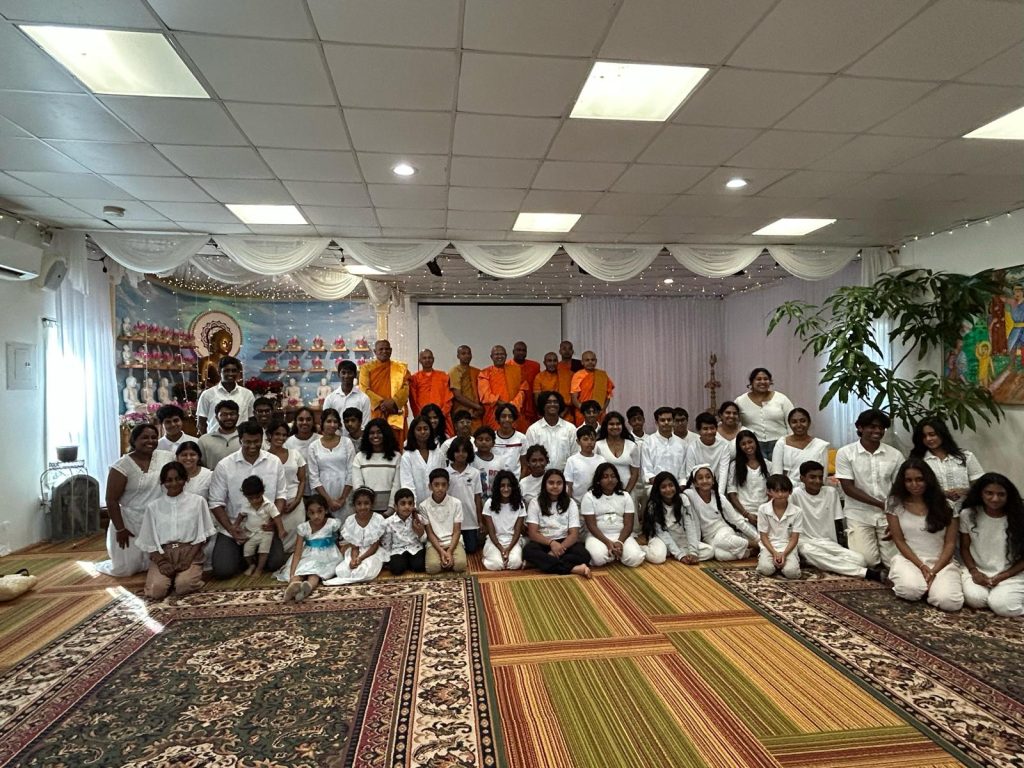
The annual Katina Punya Mahothsawa was held in Atlanta Buddhist Maha Viharaya, Georgia under the guidance of the Chief Incumbent of the Atlanta Georgia Buddhist Maha Vihara and the Chief Sanghanayake of North America, Most Ven. Panamwela Vajirabuddhi Na Thera.
The Katina Punya Mahothsawa was held under the guidance of the Chief Incumbent of the Atlanta Georgia Buddhist Maha Viharaya, Most Ven. Panamwela Vajirabodhi Thera.
“The uniqueness of the Katina Punya Mahothsawa was that the full contribution and all the organizational activities of it were carried out by Sinhala Buddhist youth living in the area”, said Ven. Okkampitiye Deepankara Thera.
The institution that forged foreign employment training certificates has been suspended…
NVQ certificates have been issued fraudulently..
The Sri Lanka Bureau of Foreign Employment has taken steps to temporarily ban the NS Lanka Training Institute in Mawanella, which forged NVQ certificates required for domestic foreign employment .
The Bureau grants approval to suitable training institutions to conduct foreign employment training through external institutions and for this, the Tertiary Education Commission ( TVC ) Approval should have been obtained. Accordingly, the above institution has been established in the Kandy area and has been certified to conduct the necessary training courses for the position of domestic helper. However, they have violated the relevant conditions and have prepared fake certificates and sold them to individuals.
Meanwhile, they have also started training courses in the Mawanella area since February 5th of this year, but the Mawanella branch has not received the approval of the Tertiary Education Commission ( TVC ). Approval has not been obtained. Information was revealed that the NVQ certificates required for the position of Domestic Housekeeping Assistant are being forged and given to trainees.
Following the revelation of the facts, the Chairman of the Bureau, Mr. Kosala Wickramasinghe, has instructed the Internal Audit Division to immediately conduct an audit on this matter. Accordingly, steps have been taken to temporarily suspend the NS Lanka Training Institute as a result of the investigation conducted. Further investigations related to this are being conducted by the Internal Audit Division of the Bureau.
NSA 2025: SLIM recognises “Ambassadors of Sales” in Sri Lanka
The National Sales Awards (NSA) 2025 organised by the Sri Lanka Insitute of Marketing (SLIM), recognises the exceptional talent and performance among the dedicated sales professionals in Sri Lanka marking its Grand Finale on 28th October 2025. This year’s theme for the NSA is “Ambassadors of Sales,” under the tagline of “The Force Behind the Figures” because sales are not merely about generating record-breaking numbers but celebrate excellence, professionalism as well as leadership.
Prof. Dewasiri N. Jayantha, President of the Sri Lanka Institute of Marketing reiterated, “Among the received 1,200 entries, we observed that there is growing female participation which we find inspiring as this is a much-respected platform that gives visibility among the dynamic sales professionals beyond the boardroom or work colleagues.”
Mr. Enoch Perera, Vice President, Events & Sustainability said, “this sales award is not merely a flamboyant ceremony but an inspiring effort for both existing and aspiring sales professionals to participate and further develop their careers.
Dr. Dilhan Sampath Jayatilleke, Vice President, Education & Research highlighted that SLIM National Sales Awards has been officially endorsed by the Ministry of Industry and Entrepreneurship Development for its significant contribution towards “strengthening SMEs, enhancing entrepreneurship, and achieving the objectives of the National SME Development Strategy Framework,” creating an opportunity with a national significance.
Speaking on this year’s NSA, Mr. Channa Jayasinghe, Project Chair, stated, “the transparency and the legacy of the National Sales Awards by SLIM has been an immense opportunity in solidifying sales professionals’ career growth throughout these years. NSA’s credibility has been further solidifying this year in receiving over 1,200 entries.
The judging process is conducted in a meticulously structured manner by an esteemed panel of industry experts, reinforcing the dedication of SLIM as the apex body in Marketing by recognising the utmost dedicated and genuine professionals in Sri Lanka’s sales sector.
Mr. Anil Kumara Meegahage, Head of Jury of NSA 2025 added, “Genuine sales excellence involves creating meaningful value for the clients in understanding their strategic needs while maintaining ethical practices as well as cultivating lasting corporate partnerships.”
Mr. Chamil Wickremasinghe, Chief Executive Officer (CEO), reiterated that SLIM National Sales Awards hold utmost recognition as the impact is not only career defining but also being a prestigious platform that forges the seal of excellence not only among sales professionals but also among marketing and business communities, including Human Resource (HR) and leadership teams.
SLIM is respected among the sales fraternity, being the apex body for the industry and having a 20+ year legacy of organizing the programme with a transparent, structured judging process led by respected industry leaders.
A UPB consignment was delivered from the United Arab Emirates to an individual in the Pichamal Wattha area of Gurudeniya, Kandy.
A UPB consignment from UAE consigned to a person of Pichchamal Watta, Gurudeniya, Kandy, was unloaded on 04-06-2025 to CSL warehouse, 760, Dr. Danister De Silva Mawatha, Colombo 09. This consignment having 6.402CBM consists of 19 packages was detained by SDC (Passenger Services) for the suspicious scan image. It was informed to collect the UPB consignment on 03 occasions, 28-07-2025, 22-08-2025 and 03-09-2025 respectively and letters were returned mentioning that the passenger’s address was inexistent.
As per the instructions of SDC (passenger services) it was decided to examine the consignment in front of the shipping agent of Nirmana Cargo and Logistics and the representative staff of CSL Warehouse.
Accordingly, the consignment was examined on 30-10-2025 in front of the shipping agent and the staff of CSL Warehouse.
Found items were inventoried and identified as
• TV stand – 04 nos, Coffee table – 04 nos, Benches with cushion – 16 nos, Sofa set (in 04 pkgs), Chairs – 04 nos, Carpet roll – 01, Air conditioner – 01, Wall arts – 02 nos. Chandeliers (03 nos.), 55” television
1412 cartons of Manchester Red cigarette and 360 cartons of Platinum Seven Cigarettes were found concealed in TV stand – 04 nos, Coffee table – 04 nos, and Benches with cushion – 16 nos. The value of the cigarettes is amounted to Rs. 26,580,000/-.



